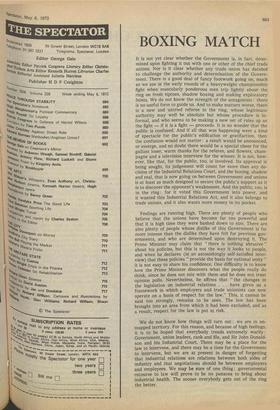BOXING MATCH
It is not yet clear whether the Government is, in fact, determined upon fighting it out with one or other of the chief trade unions. Nor is it clear whether any trade union has decided to challenge the authority and determination of the Government. There is a good deal of fancy footwork going on, much as we see in the early rounds of a heavyweight championship fight when muscularly ponderous men trip lightly about the ring on fresh tiptoes, shadow boxing and making exploratory feints. We do not know the strength of the antagonists : there is no useful form to guide us. And to make matters worse, there is a new and untried referee in the ring, whose legitimate authority may well be absolute but whose procedure is informal, and who seems to be making a new set of rules up as the fight — if it is a fight — proceeds. It is no wonder that the public is confused. And if all that was happening were a kind of spectacle for the public's edification or gratifaction, then the confusion would not matter : a result would be announced, or emerge, and no doubt there would be a special cheer for the gallant loser, warm thanks for the referee, and flowers, champagne and a television interview for the winner. It is not, however, like that, for the public, too, is involved. Its approval is being sought, its judgement will count for more than any decision of the Industrial Relations Court, and the boxing, shadow and real, that is now going on between Government and unions is at least as much designed to secure the public's support as it is to discover the opponent's weaknesses. And the public, too, is in the ring : for it voted this Government into power, and it wanted this Industrial Relations Act, and it also belongs to trade unions, and it also wants more money in its pocket.
Feelings are running high. There are plenty of people who believe that the unions have become far too powerful and that it is high time they were bashed down to size. There are also plenty of people whose dislike of this Government is far more intense than the dislike they have felt for previous governments, and who are determined upon destroying it. The Prime Minister may claim that "there is nothing abrasive " about his policies, but this is not the way it looks to people, and when he declares (in an astonishingly self-satisfied interview) that these policies "provide the basis for national unity" it is not easy to share his confidence. One difficulty is to know how the Prime Minister discovers what the people really do think, since he does not mix with them and he does not trust opinion polls. Nevertheless, he affrms that "the changes in the legislation on industrial relations . . . have given us a framework in which employers and trade unionists can now operate on a basis of respect for the law." This, it cannot be said too strongly, remains to be seen. The law has been brought into an area from which it had been excluded, and as a result, respect for the law is put at risk.
We do not know how things will turn out : we are in unmapped territory. For this reason, and because of high feelings, it is to be hoped that everybody treads extremely warily : Government, union leaders, rank and file, and Sir John Donaldson and his Industrial Court. There may be a place for the law to intervene, and there may be a time for the Government to intervene, but we are at present in danger of forgetting that industrial relations are relations between both sides of industry and that negotiations should be between employers and employees. We may be sure of one thing : governmental recourse to law will prove to be no panacea to bring about industrial health. The sooner everybody gets out of the ring the better.










































 Previous page
Previous page